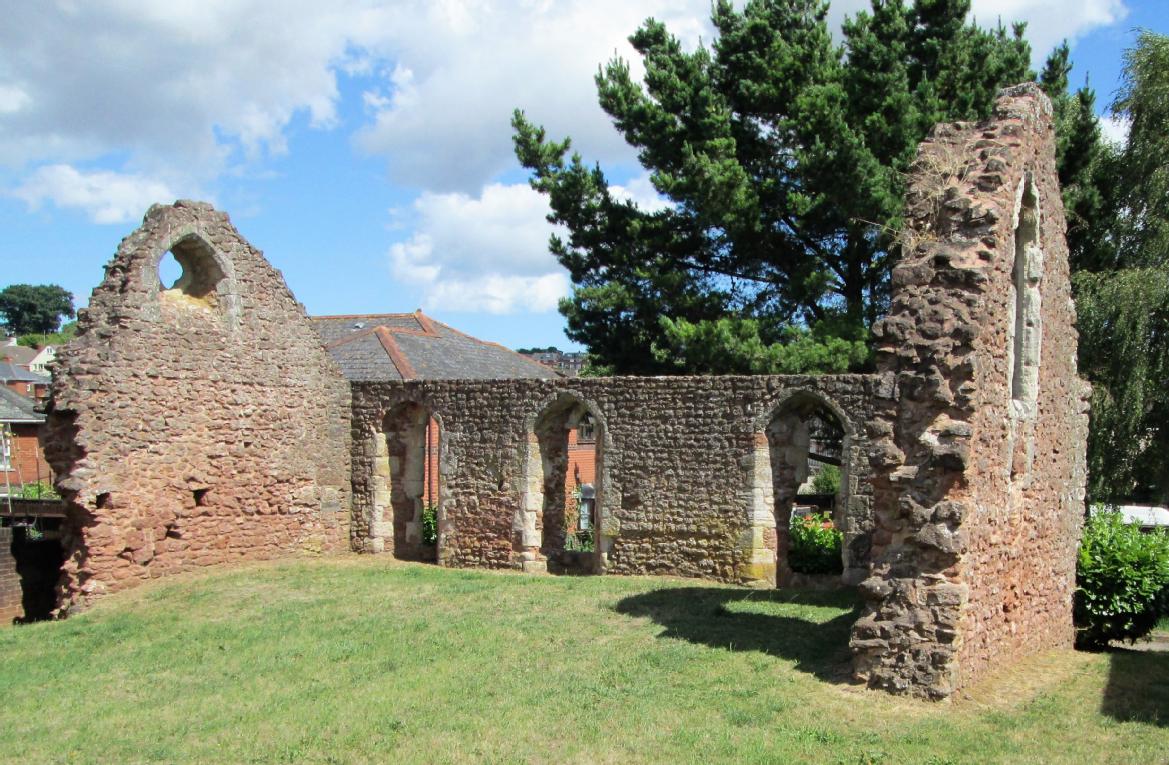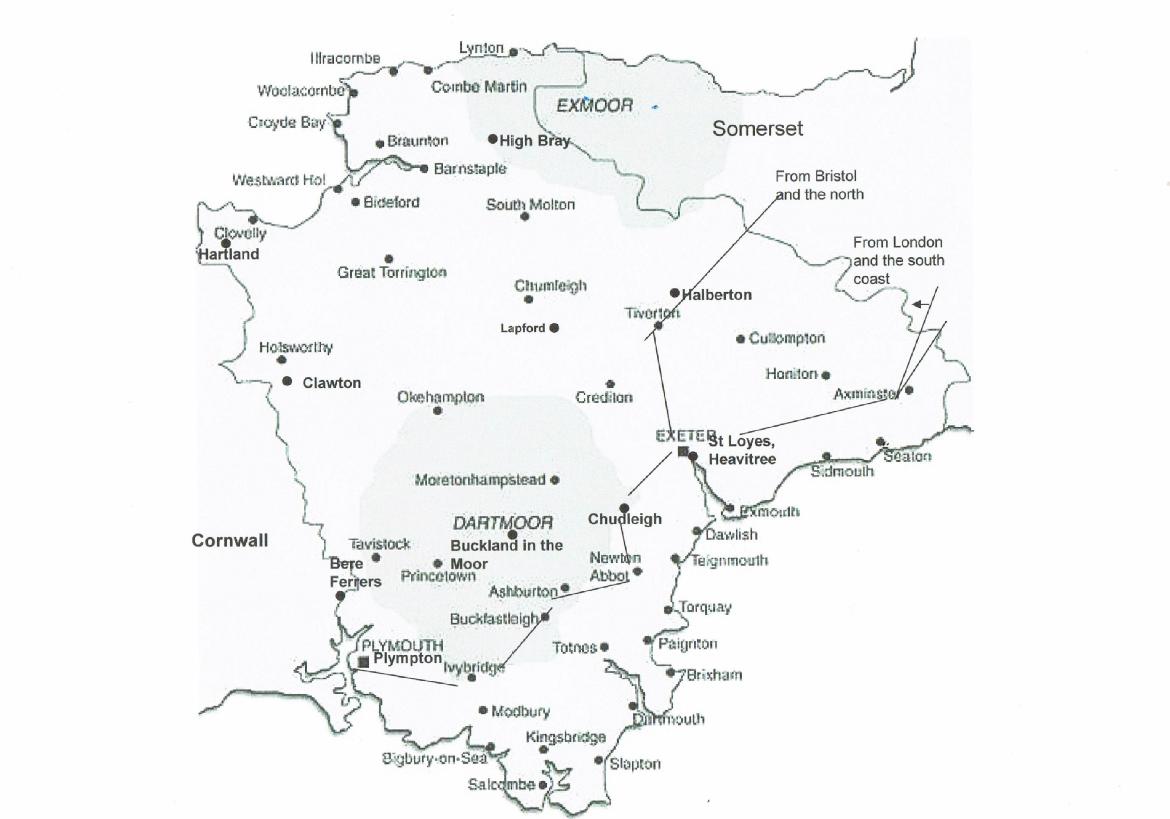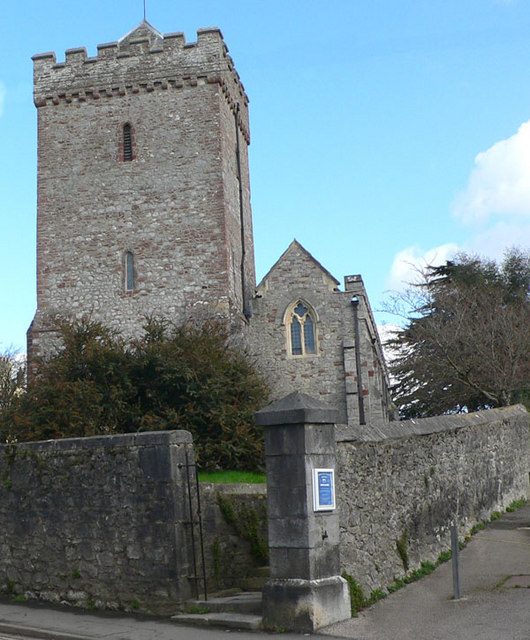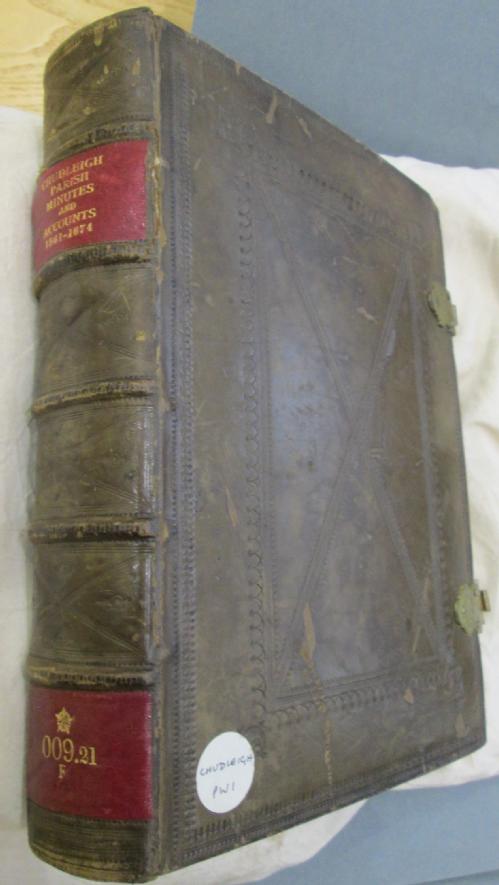State decisions: Parish problems
By Marion Hardy
‘Item pd unto henrie hullen of Tivfordton wch was taken in our wach the vii th ffebruarie and warned to be
att Chudleigh the xvj th and their prest for a soyldier for Ireland & kept by me six weeks vj shillings’.[i]
This was recorded by the churchwardens of St Loye’s, Heavitree (Fig. 1) in 1624/25 and raises a number of questions. It seems that Henrie was taken as vagrant or worse, but spared the usual punishment in favour of pressing him as a soldier, but the sixteenth, six weeks and travel time later? That would be 21 March and the records duly record on that date that Henrie and one other received their conduct money ‘& their bedding’. ‘Coat and conduct’ money was the usual for a pressed soldier. They were expected to reach Chudleigh within the day, reasonable, but why Chudleigh and ‘for Ireland’ is a puzzle, if not a mistake.[ii]

Fig. 1: St Loye’s church … all that remains today. Heavitree is served by St Michael’s, also within the parish, up the hill. The site is now surrounded by houses, but the parish included a main route into Exeter and the bridge over a river, now in a culvert in this area. Photo by the author.
St Loye’s is a parish adjacent to the eastern side of Exeter, while Chudleigh is about nine miles southwest of Exeter, roughly half the way to Newton Abbot and on the road to Plymouth (Fig. 2). Indeed, a later entry, refers to paying ‘unto Soyeldiers att sundry tymes in their passinge towards Plimouth xvijs iijd.[iii] Chudleigh was a mill and market town and the parish had, at some unknown time in the past, acquired ownership of the market, which yielded annual income, although it might also incur expenditure on maintenance. It seems to have been worth, normally, something over £30 per annum to the parish.[iv] Chudleigh was in a good position for an overnight stop for travellers, but why did the men have to report there?

Fig. 2. Map of Devon, annotated by the author, showing the main places and the routes relevant to the movement of the soldiers and seamen. The Exeter to Plymouth route was approximately that of the old A38.
Although the country had a navy, there was no standing army, so men had to be impressed when required. When Charles I gave Admiral Buckingham a rather free rein, the expedition to Cadiz, Spain, was instigated for 1625. In order to raise the necessary force, the state, represented by Buckinhgham, enlisted the aid of the county officials, the Lords Lieutenants and their deputies, who commanded the local justices of the peace, who in turn supervised the parish officials who would have to produce their share of pressed soldiers. Chudleigh parish had a resident Justice of the Peace in Dr Thomas Clifford of Ugbrooke House, with another justice based in the adjacent parish of Ashton. Chudleigh would thus have been well monitored.[v]
At this time, Exeter was a county in its own right, so pressed soldiers for the county of Devon would not report there. The Justice living in Ashton, meanwhile, was Sir George Chudleigh, who was also the deputy Lord lieutenant of the county in 1625.[vi] Thus he had responsibilities to oversee the provision of the local soldiers, for which Chudleigh, on what then passed for a main road, was better placed than Ashton. Sir George later became responsible for the billeting of the soldiers in the Plymouth area, prior to their embarkation. Whether or not Sir George’s presence was entirely responsible for the numbers at Chudleigh is debateable, but it is likely that he needed to know how many soldiers were going to be available and so it would have contributed.
While parishes seem not to have been responsible for the conduct monies, by act of parliament, it was their responsibility to aid poor travellers.[vii] Under the 1601 act, soldiers and seamen were considered more deserving than previously. The churchwardens, who were the ‘four men’ of Chudleigh, plus the constable and overseers of the poor, all unpaid officers of the parish, found themselves very busy with tasks to be carried out alongside their normal occupations (Fig. 3). Everything seemed to be running late. The first soldiers appeared in the accounts of February 1624/5, but it was from June onwards to a peak in October that travellers occasioned daily entries in the accounts. Men from many parts to the north and east of Exeter would have been sent this way. A total of 330 specified soldiers were given assistance, although there were probably more as sometimes the record just says paid to soldiers, but not how many. In addition, there were also fifty-eight seamen, twenty-three from the Low Countries and three from France, as well as higher numbers than usual of vagrants. Those from the Low Countries were likely to have been seamen, as twenty Dutch ships assisted in the expedition.[viii]

Fig. 3. Chudleigh parish church. Photo paul dickson under Creative Commons.
The most obvious impact on Chudleigh was financial (Fig. 4). In a typical year, aid to travellers constituted a small proportion of total annual outlay, of the order of just over 1 to 10 per cent, depending on other demands of the year. For the accounting year of 1625/6, which included the peak numbers of travellers, however, it was nearly 27 per cent. Further related expenses included: for the ‘watch’, to Barnaby to show the way to Newton to the conductor, paying men to go to Chudleigh Knighton [the next place en route to Newton], perhaps to accompany men and for the provision of barrow or horse transport for some.[ix] For others there was ‘lodging and diet’, straw for the soldiers for sleeping and for bread for soldiers or for the ‘king’s service’.[x]

Fig. 4: A volume of the Chudleigh accounts. Photo by the author.
As time went on, increasingly the soldiers were referred to as lame or sick and on 9 September there were three ‘sick sailors wch came from Portsmouth & for their lodging’. A few parishioners may have had short-term gains from providing services, loaning horses, carrying a barrow, or showing the way. Gibbs and widow Draton, for example, provided lodging. Even ‘old Brooking’ gained 2 d. for going to Haldon to see the man reported dead, ‘wch was not far’. However, any short-term gains were negated later. A number of hue and cries were issued in respect of soldiers, but whether to capture absconders or for what they have done is not stated.
Given that men had come long distances, lameness and want were not surprising. Ten men were dispatched from the county gaol and others sent by parishes may have been their less desirable men or those taken vagrant like Henrie Hullen.[xi] Conduct money may have been mis-spent and hungry soldiers led to further problems. What becomes clear from the quarter sessions documentation is that a number of soldiers were in trouble for stealing ducks or sheep, a problem worse in the Plymouth area, where people complained that they lacked the money to feed the soldiers.[xii] There was a suggestion that some of the money intended for soldiers’ provisions had been embezzled, possibly by Sir James Bagg, the Vice-admiral for Devon.[xiii] In August, Plympton complained that they had an army of ‘soldiers sick and naked billeted on them for thirty-one weeks without supply of money or clothes’, with similar other complaints recorded in the state papers.[xiv] By mid-October, Chudleigh’s churchwardens were clearly becoming sorely tried. Bread was given rather than money but on 15 October, five soldiers and three sailors were given 8 d ‘to ridd them out of towne’.[xv]
A large proportion of the men aided by Chudleigh were described as sick. This may have been because they, rather than the fit, needed the help, but, as we know today, long distance movements of people can spread disease. Spotted fever or plague had been suspected and on 18 September, Chudleigh paid 12 d. for a ‘coppie of the order concerning the plague’.[xvi] The parish would have been glad of the lull in activity from mid-October until sometime the next January.
The expedition did not sail until October 1625. Stormy weather resulted in the loss of one ship and 175 men. The state of the other ships and men became so serious that the first left the Bay of Cadiz on 11 November and the rest followed on 20 November. The state of the men was even worse in the wake of the failed expedition. On return to Plymouth, they were said to be “half-naked, plague-ridden and starving”.[xvii] Far fewer soldiers were recorded in Chudleigh on their return, but given the loss of lives during the expedition and from disease alongside the fact that some of the fleet perhaps returned to Portsmouth, it is not surprising. Those who did return brought disease with them.
The death toll on those of Devon was considerable, especially among those who had billeted soldiers. Plymouth is thought to have lost up to 2,000 people. Ashburton is known to have buried eighty-seven, about twice the annual average, in May 1626 alone. The number for Chudleigh is not known, as there are no records for baptisms, marriages or burials from early 1626 through until May 1627, but prior to 1622 it was circa twenty per annum, but fifty-seven in 1624/25, twenty-nine in 1625/6 and forty-four in 1627/8.[xviii] The vicar is known to have survived, perhaps because he had fled to a safer place, while further victims were recorded at St Loye’s.[xix] It is possible that the bodies of those who died of the plague in Chudleigh were buried out of the settlement in an area known as Deadman’s Coombe, west of the old road to Exeter. The costs and loss of lives all had an effect on the survivors and the economy. The overseers of the poor for 1626-27 received only £20 in rates; the rest were waived due to the ‘plague raging in Chudleigh’ as were arrears due in relation to the markets and fairs. There would have been relief that payments needed for travellers were reduced to about 7 per cent of the overall payments. However, the respite was short lived.
A dispute over shipping led to a declaration of war against France in 1627. Buckingham’s next expedition was to employ 7,000 men to capture the ÎIe de Ré to provide a base from which to assist the Huguenots of La Rochelle. In the wake of the Cadiz expedition, Devon’s ports complained that they could not provide the ships required, while the deputy lieutenants pointed out that such frequent impressments - and no doubt the earlier losses - meant that they would have to use the ‘labourers in husbandry’.[xx] Sir George Chudleigh was still one of them and responsible for billeting men. There is no evidence that the men had to report to Chudleigh again, but two thousand troops were supposed to convene in Plymouth. In addition, Devon was to press another 200 hundred. The deputy lieutenants also had the power to raise a rate. On this occasion, those of Devon had approval for a general levy of 4s. 8d. to pay for the billeting of soldiers in Plymouth. This would have affected all with the ability to pay and Devon complained. Would His Majesty
‘…make war without provision of treasure or must our country bear the charge of all England. It is not enough that we undergo the trouble of the insolent soldiers in our houses, their robbery and other misdemeanours but that we must maintain them at our own cost.’[xxi]
Although far fewer soldiers were recorded in Chudleigh than in 1625, from late 1626 numbers increased. The expedition proved to be another failure and from October through to March 1627/8 sick returnees were again a problem. Chudleigh’s almshouse was evidently in use for accommodating sick soldiers on straw and men and horses had to be used for their onward conveyance. Expenditure on such things rose to 9 to 12 per cent of annual expenditure. No doubt there were also increased demands from the overseers of the poor for the impoverished folk of the parish.[xxii] Parish affairs then calmed down through the 1630s and one hopes that there was a degree of recovery before the religious differences between king and parliament led to Civil Wars.
South Devon parishes in general, of which Chudleigh is just an example, would have drawn little comfort on learning that Buckingham’s ‘lunatic’ expeditions of war led to his vilification and his assassination in August 1628. The state had decided on those wars, the county’s Lord Lieutenants and their deputies, like Sir George Chudleigh, were the ‘middle men’ expected to carry out the state’s requests, but it was the people of the parishes who bore the ultimate burden. There was no recompense for the costs of their time, effort, losses incurred through disease or the impact on their economies.
NOTES
[i] Devon Heritage Centre (DHC), 3004A & adds/PW4/1.
[ii] Troops for Ireland normally sailed from one of the north coast ports, such as Barnstaple or Bideford.
[iii] DHC, 3004A & adds/PW4/1, undated, but after 21 March and before August 1625.
[iv] DHC, Chudleigh PW 1; in the year ended 25 May 1624/25, the value was £36-6-8.
[v] M Wolffe, Gentry Leaders in Peace and War (University of Exeter Press, Exeter, 1997), pp. 30-31.
[vi] Wolffe, Gentry Leaders, pp. 98-107; M Wolffe, ‘Chudleigh, Sir George’, in Oxford Dictionary of National Biography, www.oxforddnb.com (25-07-2012).
[vii] 43 Elizabeth I c.2: An act for the relief of the poor.
[viii] N. A. M. Rodger, The Safeguard of the Sea: A Naval History of Britain, Volume 1: 660-1649 (Harper Collins with the National Maritime Museum, 1997), p. 357.
[ix] Then Newton Bushell, but today a part of Newton Abbot.
[x] DHC, Chudleigh PW 1, pp. 477-507.
[xi] A. H. A. Hamilton (ed.), Quarter Sessions from Queen Elizabeth to Queen Anne: Illustrations of Local Government and History, drawn from Original Records (London 1878 [Kessinger Publishing’s Rare Reprints, USA, undated]), p. 107.
[xii] DHC, Q/SB Box 18, e.g. 25 August 1625.
[xiii] R. Pollitt, ‘Devon and the French and Spanish Wars’ and A. Thrush, ‘The Bottomless Bagg? Sir James Bagg and the Navy, 1623-8’, both in The New Maritime History of Devon, eds M. Duffy, S. Fisher, B. Greenhill, J. Youings (London: Conway Maritime Press, 1992), pp.108-114 and pp.115-116.
[xiv] Calendar of State Papers Domestic [CSPD], 1625-26, vol. XXXIV, item 27, 24 August 1625; vol. III, item 59, 12 June 1625; vol. IV, item 149, 30 July 1625; vol. VI, item 3, 1 September 1625. [please double-check volume nos and put them consistently in either Arabic or Roman numerals].
[xv] DHC Chudleigh PW1 p. 490.
[xvi] Wolffe, Gentry Leaders, p. 104; DHC, Chudleigh PW/1, p. 487.
[xvii] Rev. Alexander B. Grosart (ed.), The Voyage to Cadiz in 1625, Being a journal written by John Glanville, Secretary to the Lord Admiral of he Fleet…. (London: Camden Society, 1883), from Sir John Elliot’s MSS at Port Eliot.
[xviii] List of burials transcribed and available on the Genuki website.
[xix] C. Gill, Plymouth: A New History (Tiverton: Devon Books, 1993), p. 147; A. Crockett, Chudleigh: A Chronicle (Exeter: A. Wheaton & Company, 1985), pp. 28-9; DHC, 3004A & adds/PW4/1: St Loye’s paid out 3 s. for two men to carry back to Exeter ‘a soyldier wch layd in the highway with the plague sores upon him’ and a further 1 s for ‘conveying away a man wch layd dead in the highway’.
[xx] CSPD, Vol LXXIII, item 52, 7 August 1627.
[xxi] Wolffe, Gentry, pp. 121-123.
[xxii] DHC, Chudleigh PW 1, pp. 515-525.
